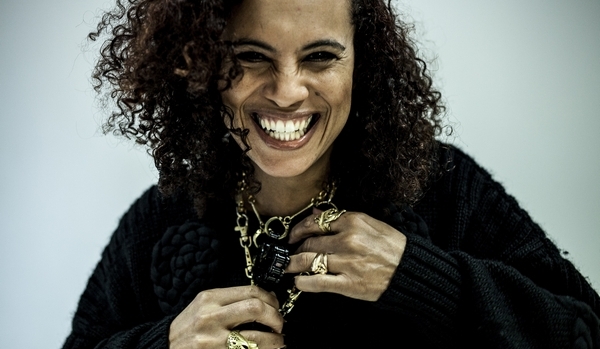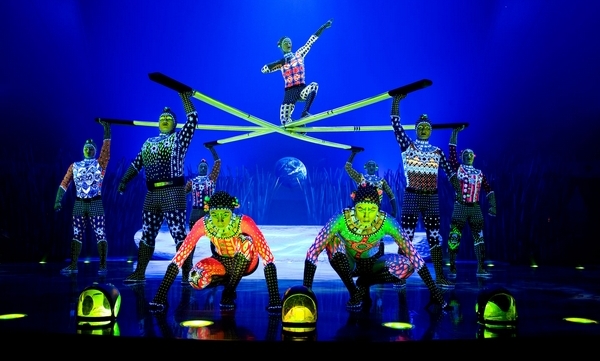Once established though, Neneh failed to capitalise on her first rush of success and by the late ‘90s she had all but disappeared from the musical map. Her last solo album Man, released in 1996 was followed by only sporadic guest appearances, until she finally re-emerged last year with striking new set called The Blank Project. Of her 18 year absence Neneh offers. “I wanted to be a part of my kid’s lives, really. Also, things had changed so much by the time Man came out, and I just wasn’t willing to compete with the likes of the Spice Girls, no disrespect to them, in order to get my music heard.” She says in an equal parts English/American/Swedish accent. Cherry sounds defeatist as she describes folding in the face of perceived ‘competition’. “I tried to make another album, but to be honest the wind had kind of gone out of my whistle a bit.” She laughs. “I had to have a longing to make another album, and that longing was gone for some time.” Motivation for recording again came once Cherry had reached a comfortable conclusion as to where she fitted in to the current musical landscape.
“I am totally into a lot of new music being made, but I had to make the decision to not worry about what’s considered cool or whatever. I had been away for some time, so I had to reconnect with that part of my brain where I wasn’t worried …or over thinking what I was doing.” The Blank Project is a collaborative effort, as with most of Cherry’s output, involving husband/collaborator Cameron McVey as well as percussion ensemble, RocketNumber9 and producer Four Tet. The resulting album is a mostly sparse collection of electro/beat poems, unlike anything Cherry has attempted before. “It’s interesting how audiences have reacted to this work.” she states “I have had some people even walk out of the shows because it’s not what they expect me to be doing or whatever, but then, I’ve also had such a positive reaction from other fans who really seem to get what I’m trying to do with this project.” It was risk-taking to make an album reminiscent in part of latter-day Radiohead, but it’s clear that the music of her roots – jazz and punk – have informed the album, giving it a raw honesty which translates well.
“When I made Raw Like Sushi and those early recordings, I kind of felt like I was outside the process a bit… sort of watching it come together. I mean those were my songs, but with The Blank Project, I felt so completely involved …like I was fully in charge of what I was doing.” It’s not commonly referenced, but while attempting to launch her solo career after stints with London punk acts Rip Rig + Panic, The Slits and X-Ray Spex, Cherry met with Pete Waterman of Stock, Aitken & Waterman fame and found herself presented with the possibility of a Kylie/Rick Astley-type pop career. “Had that little experiment not been a complete failure,” she laughs, “I would have found myself with little or no input whatsoever in my music, I think. I would have hated working in such a sterile environment for one thing. I mean I look at Kylie Minogue, who I have the upmost respect for, and although I really didn’t get her in the beginning, I see now that she has maintained her identity so brilliantly throughout her career.” Pete Waterman and Neneh Cherry’s partnership ended as quickly as it had begun, she explains. “There were no hard feelings about being rejected,” Neneh laughs. “It was pretty clear we were from different worlds and I didn’t really appreciate how they did their thing. The bottom line was Pete didn’t think my voice was ‘pop’ enough and so they manipulated my vocal and it just sounded awful.” Luckily, the song itself was not entirely shelved. Looking Good Diving With The Wild Bunch, was wisely retitled Buffalo Stance and completely overhauled by producer Tim Simenon (Bomb The Bass).
“It was Tim’s idea for me to ad-lib all the ‘know wha’ I mean?’ and ‘what’s he like anyway?’ spoken word parts in that, which I think really made the song!” The track was a global hit single and is widely rumoured to be the inspiration for Madonna’s Express Yourself. These days Neneh has gotten used to how much the track has continued to define her. “It was relevant at the time from a feminist point of view, and when I see how sometimes so little has changed for women in music, with endless videos objectifying female artists, I do feel a sense of pride that we were addressing that issue in Buffalo, but a lot still has to change, I think.”
BY LEIGH SALTER







